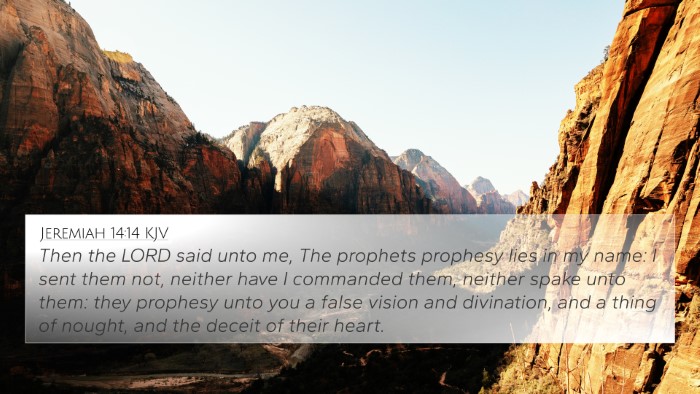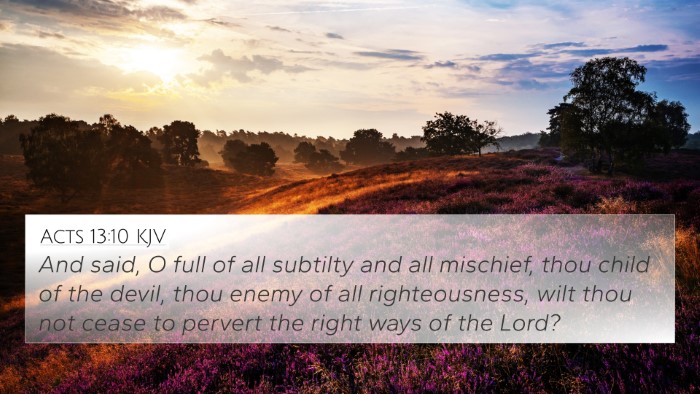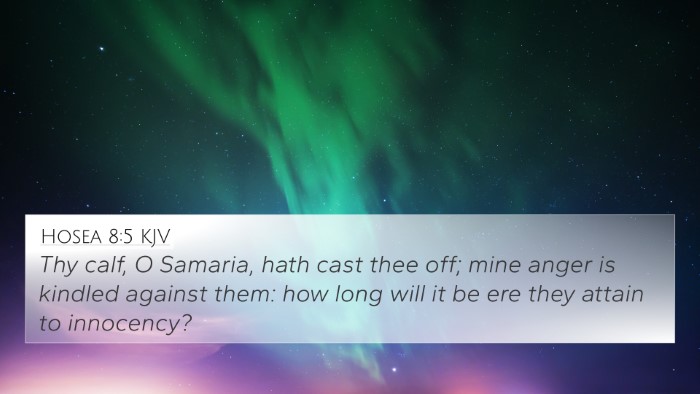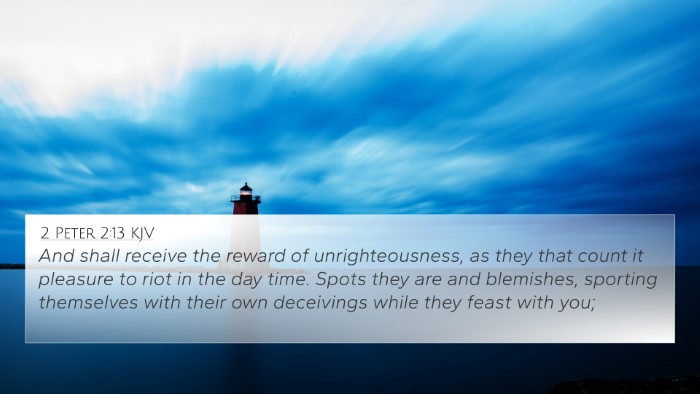Understanding Jeremiah 23:26
Jeremiah 23:26 states:
"How long shall this be in the heart of the prophets that prophesy lies? yea, they are prophets of the deceit of their own heart."
Meaning and Interpretation
This verse addresses the issue of false prophets prevalent among the people during the time of Jeremiah. The prophet Jeremiah, chosen by God to deliver messages of judgment and hope, sets the stage for understanding the significance of divine truth versus deceptive ambitions.
Insights from Commentaries
- Matthew Henry: Henry emphasizes the moral decay and the prevalent dishonesty among prophets who crafted their messages based on their imaginations rather than divine revelation. He suggests that these prophets were motivated by personal gain and societal pressures, thus leading the people astray.
- Albert Barnes: Barnes points out that the "deceit of their own heart" indicates a conscious departure from God's commandments. He warns against the dangers of listening to those who rely on selfish desires as opposed to God's authentic word.
- Adam Clarke: Clarke interprets this verse in the context of the historical background of Israel, recognizing how the people desired messages of comfort over reprimand. He also stresses that God seeks genuine repentance and truth, void of embellishments offered by misguided prophets.
Thematic Connections
In examining this verse, we can explore various thematic Bible verse connections that relate to false prophecies and the pursuit of truth:
- Jeremiah 14:14: "Then the LORD said to me, 'The prophets prophesy lies in my name. I did not send them or appoint them or speak to them. They are prophesying to you false visions, divinations, idolatries and the delusions of their own minds.'
- Matthew 7:15: "Watch out for false prophets. They come to you in sheep's clothing, but inwardly they are ferocious wolves."
- 2 Peter 2:1: "But there were also false prophets among the people, just as there will be false teachers among you. They will secretly introduce destructive heresies, even denying the sovereign Lord who bought them—bringing swift destruction on themselves."
- Ezekiel 13:3: "This is what the Sovereign LORD says: Woe to the foolish prophets who follow their own spirit and have seen nothing!"
- Isaiah 30:10: "They say to the seers, 'See no more visions!' and to the prophets, 'Give us no more visions of what is right! Tell us pleasant things, prophesy illusions.'
- 1 John 4:1: "Dear friends, do not believe every spirit, but test the spirits to see whether they are from God, because many false prophets have gone out into the world."
- Proverbs 14:12: "There is a way that appears to be right, but in the end it leads to death."
- Micaiah's Prophecy (1 Kings 22:22-23): "I will go out and be a deceiving spirit in the mouths of all his prophets. The LORD said, 'You will succeed in enticing him. Go and do it.'
Cross-Referencing Biblical Texts
The exploration of Jeremiah 23:26 encourages individuals to engage in cross-referencing Bible studies, utilizing tools such as a Bible concordance or a Bible cross-reference guide. This practice enriches one’s understanding by illuminating connections between different scriptures, particularly in the context of discerning the truth in teachings and prophecies.
How to Use Bible Cross-References
For those interested in enhancing their biblical studies, a systematic approach to cross-referencing can be particularly helpful:
- Identify Key Themes: Recognize the core theme present in the verse you are analyzing, as with the theme of false prophecy in Jeremiah 23:26.
- Consult a Bible Concordance: Utilize a concordance to find related verses, ensuring a comprehensive study.
- Engage in Comparative Bible Verse Analysis: Analyze the insights provided in related verses to gain a wider perspective of the topic.
- Integrate Insights in Bible Studies: Use findings during group discussions, sermons, or personal study for deeper understanding.
Conclusion
In conclusion, Jeremiah 23:26 serves as a critical reminder of the necessity of seeking truth and sound guidance. Engaging in the practice of cross-referencing and exploring thematic connections between Bible verses enriches biblical understanding and equips believers in their spiritual journeys. By discerning the motives behind teachings and aligning them with God’s Word, one may safeguard against the subtle deceptions that false prophets bring.
Utilizing the right tools for Bible cross-referencing, such as concordances and guides, can aid in identifying connections between the Old and New Testaments, as well as enhancing individual and communal studies of Scripture.














